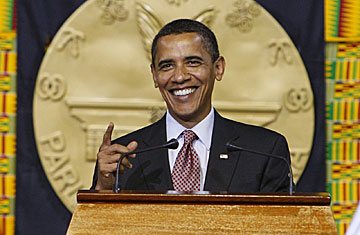
President Obama speaks to the Ghana Parliament in Accra, Ghana, Saturday, July 11.
American leaders usually speak of Africa in the abstract, as a problem in need of solution: a place of epidemic, hunger, genocide or coup d'etat. On Saturday, Barack Obama, the first U.S. president of African descent, came to Ghana to speak about the continent in the personal and the particular, as his own ancestral homeland for which he now offered a vision.
"I have the blood of Africa within me," he declared to cheers before the Ghanaian parliament. "My family's own story encompasses both the tragedies and triumphs of the larger African story."
He spoke of his grandfather, who cooked for British colonialists in Kenya and was called "boy" for much of his life. He spoke of his father, who grew up a goatherd, only later to attend American universities. He then referred to his own story, repurposing the "Yes We Can" mantra of his own presidential campaign as a call to action for the African continent to embrace. "You have the power to hold your leaders accountable, and to build institutions that serve the people," he said, in a message to Africa's youth. "You can serve in your communities, and harness your energy and education to create new wealth."
The Accra speech was the fourth attempt in as many months to lay out Obama's vision for a new era of global cooperation. Many of the themes from his addresses in Prague, Cairo and Moscow returned to the fore. Obama described a future anchored in institutions of governance and international agreement, where tribal identities would be subsumed by a common sense of humanity and international economics would turn old national competitions into alliances. He portrayed the peaceful transfer of power in competitive democracies as the next step in Africa's century-long emergence from the shackles of colonial rule. "This progress may lack the drama of the 20th century's liberation struggles," he said. "But make no mistake: it will ultimately be more significant. For just as it is important to emerge from the control of another nation, it is even more important to build one's own."
As if to illustrate the point, Ghana's parliament, divided by party affiliation, often applauded in sections, as one party or another latched ONTO a word like "corruption" to needle its political opposition. Yet there is no doubt that Ghana, both its government and people, are united in welcoming Obama, the third consecutive U.S. President to visit this nation. People on the street lined motorcade routes chanting Obama's name and wearing T-shirts with his likeness, and billboards welcoming the first couple were ubiquitous in Accra. One sign called Michelle Obama "Our First 'Rock.'" Another said simply, "Ghana adores you."
At a morning ceremony with Ghanaian President John Atta Mills, Obama was serenaded with an eponymous song in his honor by the local reggae star, Blakk Rasta. "In a dis ya time a black American president a great sign," read the song's lyrics. "Too long dem disrespect blacks and Africans combined." After the speech, Obama, his wife and children took helicopters out to the Cape Coast Castle, which for centuries served as a major Portuguese depot for slaves bound to America and the Caribbean. "I think it was particularly important for Malia and Sasha, who are growing up in such a blessed way, to be reminded that history can take such cruel turns," the president said after the tour.
The liberation of Ghana from colonial rule, in 1957, had its own effect on American history: It served as a source of inspiration for the American civil rights movement. Dr. Martin Luther King Jr. visited Ghana on the heels of the Montgomery Bus Boycott and drew hope from the African nation's experience, which Obama noted in his speech. "Dr. King was asked how he felt while watching the birth of a nation," Obama told the parliament. "And he said: 'It renews my conviction in the ultimate triumph of justice.'"
This rhetorical praise of human rights and justice has remained a core tenet of Obama's foreign policy, though his arrival in Africa is marked by mixed signs of political progress. Recent years have brought coups to Mauritania, Madagascar and Guinea, and distorted or disputed elections in Nigeria, Kenya and Zimbabwe. It was to this continued unrest that Obama seemed to direct his message, which was clearly scripted more for an African audience than an American one. The U.S. State Department arranged for listening events in several countries on the continent to get the message out. "Africa's future is up to Africans," Obama said. "The people of Africa are ready to claim that future."
During his own presidential campaign, Obama had repeatedly evoked his ability to identify with and inspire African citizens as one of his qualifications for the job as President. On March 4, 2008, during a speech in Texas, Obama told a story an 81-year-old Ugandan who stayed up until 5 a.m. to watch the Iowa election results. "The world is watching what we do here," Obama declared then. "The world is paying attention to how we conduct ourselves."
More than a year later, as president, Obama came to tell Africans that they themselves could one day be a model of democratic government, much as Ghana has been a model in the region. "We all have many identities — of tribe and ethnicity; of religion and nationality," the president said, preaching his universal vision of humanity. "Africa's diversity should be a source of strength, not a cause for division." Obama was, once again, bringing the philosophies he adopted as a community organizer in Chicago to the world stage, this time in Africa as perhaps the world's most powerful man. When he was done, the Ghanaian Parliament gave him a standing ovation.
